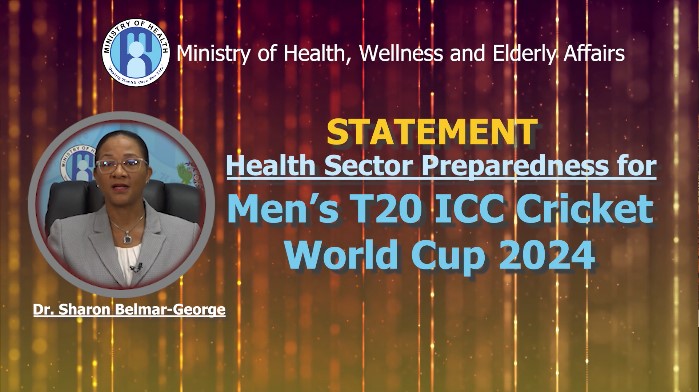St Lucia’s health sector prepares for ICC Men’s T20 World Cup

By Caribbean News Global contributor
CASTRIES, St Lucia – As the host of the ICC Men’s T20 World Cup from June 15-24, 2024 and Saint Lucia Carnival from July 1-17 much is at stake to security services and protection, health and wellness issues.
“The men’s T20 ICC Cricket World Cup is classified as a mass gathering sports event and poses health challenges due to the concentration of large crowds,” says the Ministry of Health, (MOH). “Host countries must be equipped for the early detection of outbreaks, potential bioterrorism threats, increased injuries and violence, ensuring timely and appropriate public health interventions for the safety and well-being of participants, spectators and the host country population.” ~ MOH.
The Men’s T20 ICC Cricket World Cup is scheduled across six Caribbean countries – Antigua and Barbuda, Barbados, Saint Vincent and the Grenadines, Saint Lucia and Trinidad and Tobago alongside the United States of America from June 4 to June 30, 2024.
In an effort to facilitate the hosting of such a monumental mass crowd event, the MOH with the support of the Caribbean Public Health Agency (CARPHA) and Pan American Health Organisation (PAHO) has taken a proactive approach to ensure the comprehensive mass gatherings risk assessment for Saint Lucia is done with the preparation plan, reports MOH:
“CARPHA has led the coordinated surveillance response to ensure robust health security measures are in place throughout the Caribbean. A potential health risk is posed due to the increased number of visitors arriving from diverse regions with diseases that are not endemic to the Caribbean. As such, Saint Lucia has implemented enhanced surveillance systems at designated sites linked to the cricket matches.
“A risk communication plan to identify the major health and information hazards during the hosting of the matches and to assess the levels of risk at the match venues is also in place. The main focus of this plan is to identify and implement communication mitigation measures for the hazards. This includes the education of spectators on disease prevention measures and hygiene practices.
“The laboratory capacity is also enhanced during the period with improved rapid testing of diseases of public health importance through the procurement of specified laboratory tests. This is focused on diseases not endemic to the region and biothreats. Arrangements have been made for referral to CARPHA for specific tests. A team from CARPHA will be on island to support surveillance and laboratory testing.”

Recently, the Millennium Heights Medical Complex highlighted the challenges faced, particularly within the Accident and Emergency (A&E) Department.
“Due to the number of very sick patients seeking care and the increase in patients requiring admission, the hospital has been grappling with a shortage of beds,” Dr Labadie, further noted that this issue is exacerbated by the rise in motor vehicle accidents and injuries from violent acts such as gunshot wounds and stabbings. This influx of very sick patients and the subsequent increase in hospital admissions have led to a significant bed shortage.
St Lucia’s water-related emergency ‘presents several health hazards’, says MOH
Last week, the MOH reported: “For this year, to date over 700 cases of gastroenteritis have been recorded, a 30 percent increase in the numbers recorded for last year at this time; 5 percent of these cases have been admitted to and treated in hospital.”
“Meanwhile, barely coping, cows stormed St Jude hospital grounds for desperate pasture, in full view of security at the inconvenience of hospital staff, patients and the amusement of onlookers. The grazing cows were undeterred by time and circumstance.
“The nearby goats would not be outdone and attempted to keep their appointments with the medical staff. The goats were desperately in search of medical cubicles, but to no avail, were hurriedly re-routed. But not before leaving organic droppings on an ostensively well-kept hospital floor.”

The MOH in preparedness for the ICC Men’s T20 World Cup, advised:
- “The health infrastructure readiness assessment [was] carried out to assess the readiness of human and other resources at local healthcare facilities to handle potential health issues, including surge capacity for increased patient load. Medical services will be available at all match venues. During the period of the cricket matches from June 15-24, 2024 the Gros-Islet Polyclinic will provide 24-hour health coverage. This will allow full access to care especially for the late matches and after parties.
- “The Environmental Health Department will carry out Vector control measures including daily fogging of match venues to prevent the spread of vector-borne diseases. Stringent food safety standards at event venues, ensuring the safety of food and beverages served to participants and spectators. Infection Prevention and Control training has been delivered to key personal in hospitality services at event and accommodation sites. Port health systems have also been strengthened.
“Let us enjoy the spectacle of the ICC Men’s T20 World Cup 2024 safely,” noted MOH, to advise “the public who attends the T20 Cricket to take all necessary precautions to maintain health and wellness.”
MOH advisory reads:
“Drink in moderation, do not drive under the influence, do not smoke in public spaces, stay home or seek medical care if unwell, avoid disputes that may end in violence, obey traffic guidelines, keep hydrated by drinking sufficient water during the matches and after every drink with alcohol, use mosquito repellent, especially during night matches and protect your skin with sun-block during day time matches.”
Source: caribbeannewsglobal.com

